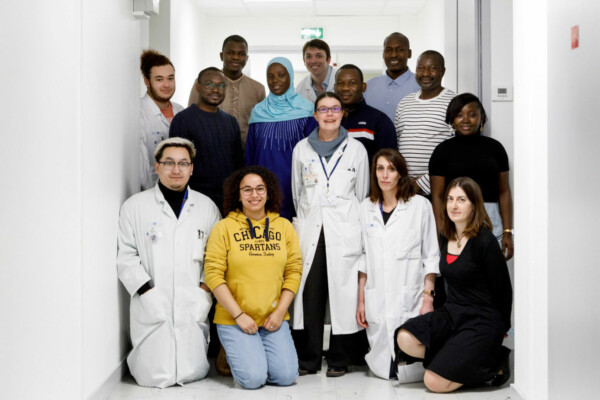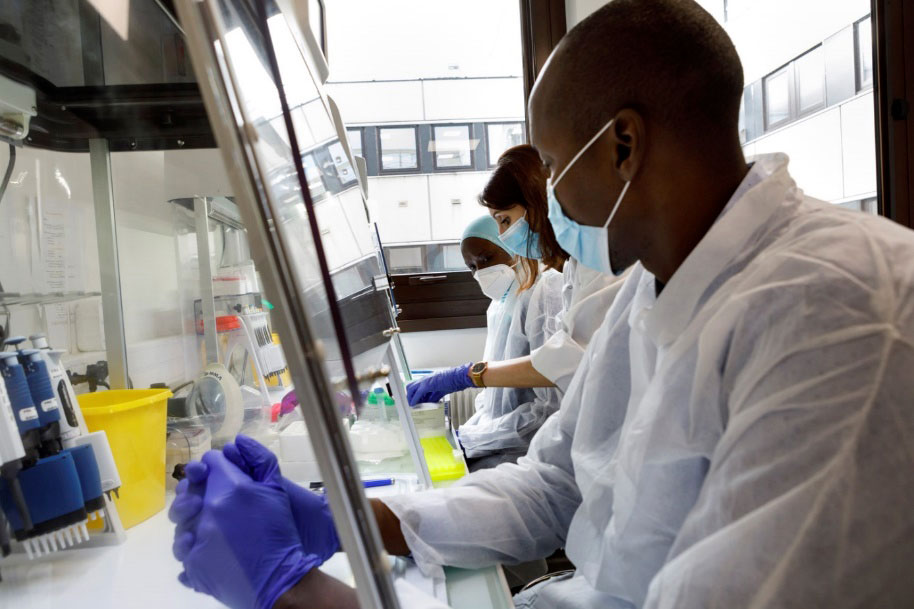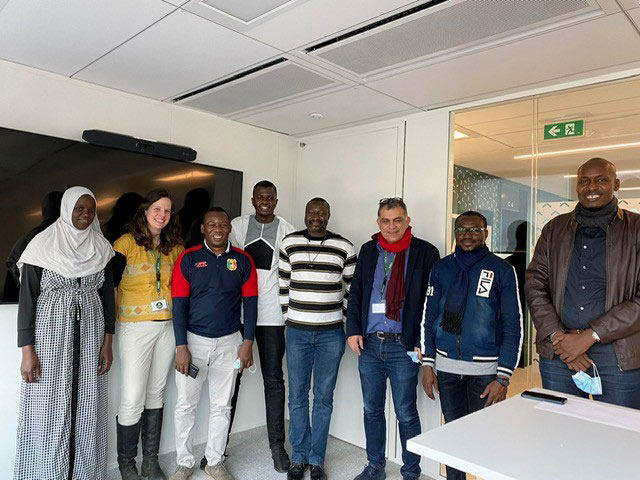Sequencing training organized in February 2022
Sequencing training organized in February 2022
Within the framework of the project, several laboratory trainings are planned, in order to strengthen the capacities of the laboratories of the partner countries, especially in the field of sequencing. Here is a look back at a training session organized in February 2022 at the genomic platform of the Henri Mondor University Hospital (AP-HP) in Paris.

For 3 weeks, six participants – Pr. Lamine DIA (CHU de FANN, Senegal), Dr. Fatoumata Diallo (CHU de FANN, Senegal), Dr. Ibrehima Guindo (INSP, Mali), Dr. Noumou Yacouba Keita (INSP, Mali), Dr. Dramane Kania (Centre Muraz, Burkina-Faso), and Dr. Arsène Zongo (Centre Muraz, Burkina-Faso) – scientists from the project’s partner laboratories, were welcomed by the ANRS | Maladies infectieuses émergentes at the genomic platform of the Henri Mondor University Hospital in Paris for a training session.
The objective of this training was to strengthen the sequencing capacities of the six participants: completion of all the steps to sequence SARS-CoV2 on the NGS platform that will be made available by the project; the subsequent bioinformatics analysis to obtain the final genomic sequence as well as the submission on GISAID, the free public platform for sequence sharing at the global level.

As part of the project, several sequencing equipment will be sent to the various partner laboratories. This t
As part of the project, several sequencing equipment will be delivered to the different partner laboratories. This training allowed the scientists to become familiar with these models of machines, in order to be operational as soon as the equipment and consumables are received.
The participants were also able to work on samples from their own countries, brought in for the occasion. This allowed them to obtain valuable data, which they were able to send to their Ministries of Health.
Back in their laboratories, the participants will also be able to train their teams to these new techniques.
The coordination team expresses a big thank you to the participants for attending this training, as well as to the team of the Henri Mondor University Hospital for its welcome and its support during these 3 weeks of training, and to Science Accueil, partner of the ANRS | Maladies infectieuses émergentes, which ensured welcoming, follow-up and support of the scientists throughout the training.

To find out more, find the interviews of two participants:
For 3 weeks, six participants – Pr. Lamine DIA (CHU de FANN, Senegal), Dr. Fatoumata Diallo (CHU de FANN, Senegal), Dr. Ibrehima Guindo (INSP, Mali), Dr. Noumou Yacouba Keita (INSP, Mali), Dr. Dramane Kania (Centre Muraz, Burkina-Faso), and Dr. Arsène Zongo (Centre Muraz, Burkina-Faso) – scientists from the project’s partner laboratories, were welcomed by the ANRS | Maladies infectieuses émergentes at the genomic platform of the Henri Mondor University Hospital in Paris for a training session.
The objective of this training was to strengthen the sequencing capacities of the six participants: completion of all the steps to sequence SARS-CoV2 on the NGS platform that will be made available by the project; the subsequent bioinformatics analysis to obtain the final genomic sequence as well as the submission on GISAID, the free public platform for sequence sharing at the global level.

As part of the project, several sequencing equipment will be sent to the various partner laboratories. This t
As part of the project, several sequencing equipment will be delivered to the different partner laboratories. This training allowed the scientists to become familiar with these models of machines, in order to be operational as soon as the equipment and consumables are received.
The participants were also able to work on samples from their own countries, brought in for the occasion. This allowed them to obtain valuable data, which they were able to send to their Ministries of Health.
Back in their laboratories, the participants will also be able to train their teams to these new techniques.
The coordination team expresses a big thank you to the participants for attending this training, as well as to the team of the Henri Mondor University Hospital for its welcome and its support during these 3 weeks of training, and to Science Accueil, partner of the ANRS | Maladies infectieuses émergentes, which ensured welcoming, follow-up and support of the scientists throughout the training.

To find out more, find the interviews of two participants: